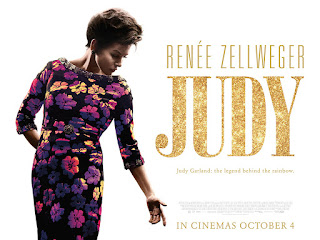Judy (Dir Rupert Goold, 1h 58m)
Judy, at its heart, is a film about fame-alongside the equally iconic, and equally misunderstood figure of Marilyn Monroe, Judy Garland is certainly a figure often daubed as a victim of her own success, her positively abusive childhoood that made her a star leaving her a neurotic, depressed drug-addicted tragic figure, resorting to living out of hotels, heavily in debt, and eventually reliant upon continual touring to keep herself afloat, before dying at 47 in the summer of 1969. But Judy, whilst acknowledging how damaged Garland was as a woman and a performer in his last years, paints a picture, through a career-defining performance from Renée Zellweger, of a defiantly proud performer, drawn, despite her complex relationship with her fame, and the damage it has caused, to the stage, to performance, and to her audience in a beautifully crafted biopic of the last years of the life of one of cinema's great icons.
Focusing largely upon the final year of Garland's life, and her series of performances at the London nightclub "The Talk of the Town", interspersed with flashbacks to the younger Garland, and the extreme restrictions that the monstrous figure of Louis B Mayer, founder of MGM, places upon her and other stars, Judy wastes no time in indicating quite how dire the straits Judy is in, with her hotel suite released, her children forced to live with her ex-husband, and her money all but gone. Much of the rest of the film essentially explores, as Garland performs over a number of nights at the Talk of the Town, her ailing health, her failing ability as a performer, her relationship with her fanbase, including, in one genuinely affecting scene, her popularity with gay men, and finally her legacy.
This it does with broad, but evocative brush-strokes-a party at which she meets her fifth and final husband also includes her daughter, Liza Minnelli (a small, but well played role for Gemma-Leah Devereux), fully underpins the sense that, for all the financial worries that Garland suffers, she is still "the world's best entertainer", and still the most famous person in the room. In contrast, her meetings with her former husband, one in LA, one in London, in which their children seem to be the one thing they have in common are tense affairs in which Judy seems out of her depth, and her relationship with her fifth and final husband, the musician Micky Deans, soon sours, with Deans storming out after delivering uncomfortable home truths.
Certainly, in any scene that is not Judy performing, there is a sense of vulnerability, both as a child and an adult- the film begins with a near minute long closeup on the younger Judy (Darci Shaw)'s face as Mills demeans her, reminds her that without her voice and his studio, she is nothing, and notes that she would be "swallowed up by America" were she to leave. Other scenes with the younger Judy cement the sense that her stardom is a curse and a cage, her scenes where she disobeys the diet that left her on soup and lettuce, fights against the barbiturates that the studios had many child actors take to keep them awake for longer, which leaves the adult Judy practically narcoleptic, tossing and turning in many scenes, only to sharply remind us that Judy's fame, her contradictory moth-like relationship with the stage and the audience, essentially traps her.
Nowhere does the film capture Garland better than as a performer, though, in its mix of acidity, vulnerability, and professionalism, Zellweger nails every aspect of Garland. The scenes at the Paladium are, without a doubt, the highlight of the film, not only in Zellweger's pitch-perfect recreation of Garland as a performer, down to the mannerisms, her unique, unmistakable singing style and the way she moves around the stage, but also in the very way they are shot.
Yet, the highlight, the film that shows the sense of Garland as a performer best, is a far more intimate scene in which she entertains two gay men, to whom, hearing of the imprisonment of one, exclaims that people attack that which is different to them. In one, small, intimate scene, this film captures, perfectly, the personal relationship between performer, and audience, which it calls back to late in the film.
It is this defining moment that the film closes on, in this film that deals with both the scars of fame on a young woman practically born into performing, and the inexorable hold that the stage, and the audience have on her. Her final words, the finale to this most personal of moments writ large, of that interaction between audience and performer. She asks simply: "You won’t forget me, will you? Promise you won’t." More than anything, Judy captures, in Zellweger's performance, her songs, her relationships with audience and family, why Garland, a half century after her death, is unforgettable.
Rating: Highly Recommended.



Comments
Post a Comment